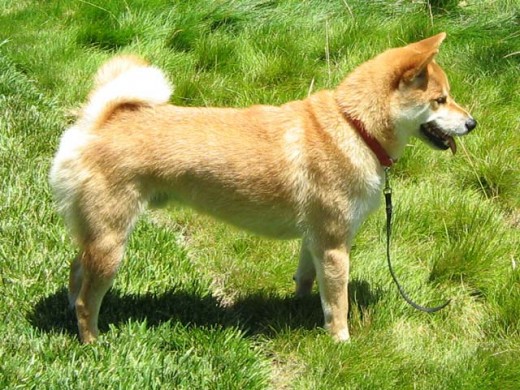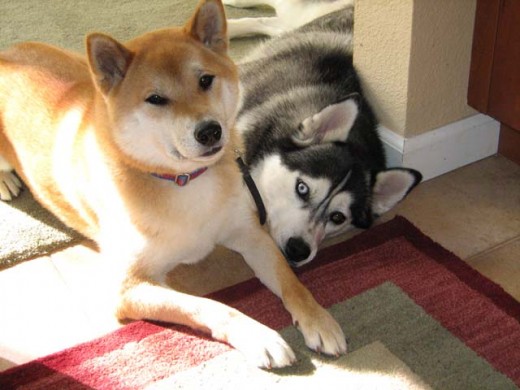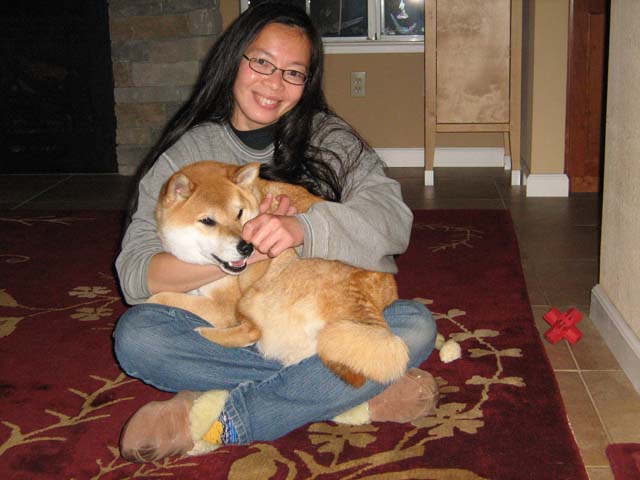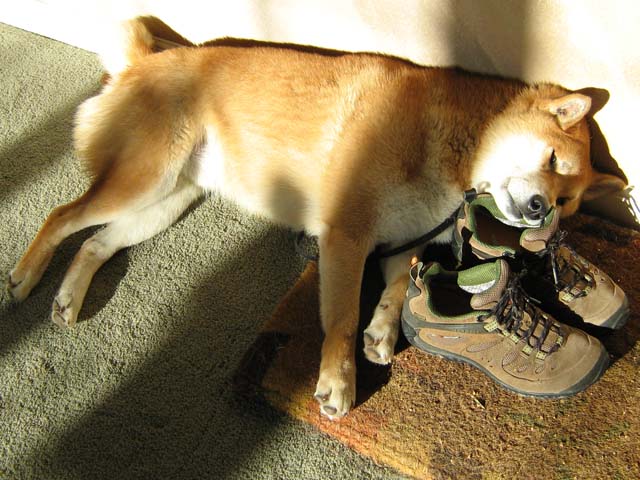What is a dominant dog?
Some people attribute all problem behaviors to “dominance“, while others do not want to use the “dominant dog” label at all. The truth, as always, is somewhere in-between.
It is useful to recognize dominant behaviors in our dog, so that we can better manage him, keep him safe, and set him up for success. Refusing to use the word dominance, or denying its existence in dogs, is unhelpful.
Any pack animal including humans and dogs, have to deal with dominance issues, because it is part of pack dynamics.
Similarly, trying to explain everything away by using the dominant dog label or excuse, is also unhelpful. To really fix a problem behavior, we want to fully understand it, and correctly identify its source. For example, a dog may show aggression because of dominance. However, dog aggression can also be the result of fear, stress, play, curiosity, boredom, or something else.

Dog Dominance
Dominance is a fluid concept.

Dogs are not dominant all of the time.
For example, many dogs will show greater dominance when they are on home turf, or when their owners are around. Under different circumstances, these same dogs may become less assertive, or may even become submissive.
Observe our dog carefully, and identify when he is more likely to show dominance, and why.

Dominance is a relative concept.
My Shiba Inu, for example, is more dominant than most dogs I have owned. He challenges me more frequently, and is constantly testing his boundaries. He has a dominant body posture, and he will not back down when challenged by other dogs.
My Siberian Husky, is a more submissive dog. She usually stops whatever she is doing, when I tell her to. She very quickly backs down, and uses submissive body language, when confronted by other dogs.
However, this does not mean that my Husky will always back down, or never show any dominance behavior. She simply prefers to avoid conflict, and has learned that she usually gets more, by seeking a peaceful resolution. I make sure to encourage this behavior, by rewarding calmness and conflict avoidance very well.

What is a Dominant Dog?


- A dominant dog will likely respond with aggression when he is frustrated, or when he feels threatened. He may also redirect that aggression onto us, if we try to physically engage him.
- A dominant dog is more forceful when it comes to fulfilling his own needs and goals. He is not afraid to challenge those around him, and to continually test his boundaries. My Shiba Inu is always testing to see if particular rules, such as the no getting on furniture rule, still hold true.
- A dominant dog is more likely to fight, and less likely to submit or run away. My Shiba Inu likes playing with other dogs, but he generally does not get along with dogs who try to dominate him. If challenged, he will not back down, and this can result in a dog fight.

Dealing with a Dominant Dog

1. Calm and decisive pack leader
Being angry and shouting at our dog, will only worsen his behavior. Fear and uncertainty will increase his level of stress, and cause him to behave in a more erratic fashion.
The best way to deal with a dominant dog is to remain calm, and firmly remove him from the environment or object, that is causing him to act out.
2. Avoid physical corrections
Contrary to common belief, physical force or physical corrections is NOT a good way to deal with dominant dogs. If not perfectly executed (with perfect timing, force, and technique), a physical correction may further frustrate our dog, and cause him to get more aggressive.
Instead, stay calm, keep physical interactions to a minimum, and quickly leave the stressful situation. In addition, using physical force against a dog, may end up teaching him the wrong lesson; in particular, use violence against violence.
True alpha dogs lead by controlling the pack’s resources. We can control our dog’s resources by following the NILIF (Nothing in Life is Free) program, and using reward obedience training.
3. Management and supervision
We want to step in and stop any aggressive behaviors, before our dog escalates and loses control. Prevention is key when dealing with a dominant dog. It stops him from practicing aggressive behaviors, and it enforces the important lesson that we are calm and in charge.



4. Consistent rules
To become a good pack leader, it is important to develop a set of house rules and some structure, for our dog to follow. Always be consistent with enforcing all of those rules.
My Shiba Inu’s most important house rules include –
- No getting on furniture,
- No biting on people,
- No leash biting, and
- No food aggression or resource guarding.
5. Frequent obedience training sessions
Schedule at least two or more short (10 – 15 minutes) obedience training sessions with our dog, every day. It is a good idea to keep up with obedience exercises, throughout a dog’s life. This keeps him mentally sharp, and makes it clear that we are in charge.
6. Use proper equipment to control our dog
When dealing with aggression, safety should always be a primary concern.
Use whatever equipment is necessary, to keep all the people around our dominant dog safe. A drag lead may also be useful because it gives us good control of our dog, without having to lay hands on him or his collar, and without resorting to chasing games.
If our dog has a bite history, it may be necessary to use a muzzle. I like the basket muzzle because it does not overly constrain a dog’s mouth, and is more comfortable. A basket muzzle will still allow a dog to eat and pant.
Be careful not to aggravate our dog’s aggressive behavior by overly constraining him, and causing barrier frustration. When in doubt, consult a professional trainer.
7. Set our dog up for success
Try to minimize the number of dominant displays. Identify objects (e.g. other dogs, cats) and environmental conditions (e.g. loud noise) that trigger dominant behaviors, and avoid those triggers.
Then, gradually desensitize our dog to those events, in a controlled fashion.

Many dog behavioral issues, including resource guarding, biting people, dog-to-dog aggression, sensitivity to handling, growling at humans, and general disobedience, are often attributed to “the dominant dog”.
However, each of these problems are unique, and complex. They are usually the result of many factors, one of which may be dominance. In fact, many behavioral issues are the result of stress and fear, and have nothing whatsoever to do with dominance.
When dealing with dog behavioral issues, it is best to keep an open mind.
Observe our dog and his environment carefully. Identify the triggers for his aggressive behavior, and try to understand why he is responding in this way. If his aggression is extreme (e.g. he is breaking skin, and/or causing puncture wounds), hire a professional trainer to help us carefully trouble-shoot the problems.

Hi, thank you very much for the useful information! I have an Akita boy about 7months old! He’s a lovely boy. But, occasionally he jumps on me, growl and bite during the training section or after a long walk like he’s just frustrated with the command that’s given and started to be the boss as in like hey that is enough I’m done doing this!!!
He sometimes also like to jump on me out of a sudden and started to hump and I would just say no and ignore him!
Is there any more advice you can provide in case my Akita mouth on me during training section? He is a very dominant dog! Though he doesn’t growl at me when I try to take away his food bowl.
Appreciate your help:)
My 5 year old boxer bull mastiff Ruby-ALWAYS GOES FOR THE OTHER DOG! Regardless of what the other dog is doing, or shows aggression towards absolutely anybody unless you have met her a few times. Makes it difficult to take her to dog parks- even if she has a muzzle she will still bulldoze any other dog and pin them down as if any other dog is a threat and there is nothing that can be done. She is a 50kg dog made of all muscle- we rescued her as she was passed from house to house and we think someone tried to use her as a fighting dog. She’s okay with one of our mates dogs but that’s it. Even a trainer couldn’t get near her to help us- she was dead set on getting him!
hi!
I have a year and a half year old pit bull boxer mix. She is a great dog, very smart, huge cuddler, loves humans, dogs, and cats. She is dominant though. She will tackle another dog, and then lay or sit on them. She never bites but does get loud. Because of her breed people get scared of her with their dogs. I want to be able to take her to the dog park without worrying about other dog parents commenting. She’s not aggressive whatsoever but this is just cause for concern. Any suggestions?
Hi I got a pug about 9 mounths ago, he used to live at my mums house with my mums two dogs and they used to fight all the time usually diesel ( the pug) starting it he will circle around the other dogs and stare at them! I have recently moved out and we have another dog now witch it my partners and my dog bites at his lips until they bleed! And if I ever take him to my mums place the fights get worse and worse I have got bitten a few times splitting them up when it got really bad. It’s gotten to the point we’re he bites at my legs to get attention! I always tell him no walk away ignore it and then he just keeps going even with the dogs at my mums house he never stops and never runs out of energy. I have taken him to puppy obidience school and am considering taking him to adult obidience school I am worried he will get hurt or one of the other dogs
Hello,
I have a 3 year old yellow lab/German Shepard mix that has started becoming aggressive with my 7 year old jack-a-bea. The lab was raised with the jack-a-bea.
We have 2 children with emorional issues and scream, slam doors, repeatedly ring the doorbell. Recently, in the past month, if she hears any of these sounds she will jump up, race downstairs, and get aggressive with the other dog. She has broken the skin on the other dog a few times (nothing serious requiring stitches).
When this happens I follow her and separate the dogs. She will then calm and even go to the other dog and lick her face and body. I’ve taken to separating her immediately to my room and shutting the door.
The aggressive behavior always follows one of the triggers I mentioned before. What else can I do? There is no aggression toward any people in the house, only the other dog. The rest of the time They get along very well.
Thank you,
Dawn
Hi, first off, thank you for taking the time, and for caring. Your post is great, and your replies come from experience, and are caring and well thought out.
I have two dogs, both rescues. One, a likely St, Bernard/Pitbull mix who is almost 9, has, in the last 6 months, started to be aggressive to certain dogs. He is a neutered male, and at first his aggression seemed to be only towards unneutered males. But recently he has gone after a female as well. He has never broken the skin, but he seems to be on the hunt when we are at the dog park for a dog he can dominate, or be aggressive towards. We just moved from AZ where no one had their dogs out, and Rusty was never socialized properly. She only had her bossy sister who dominated over him his whole life. My thoughts are that he now sees that he can be the boss of someone, and he is doing it aggressively, the way our other dog dominated him?
Anyway, it has become a real problem and I can no longer let him off leash in the park because he always finds a dog to chase down and be very aggressive towards.
I am going to start with the tips you gave above:
– Keep calm and positive
– short and sweet interactions, on leash
– do not use physical force or too much restrain as corrective methods
– If he becomes aggressive toward another dog, I will remove him from the situation and start practicing obedience training.
Please let me know if you think this is a good start, and if you have any other advice that would be great!
Thanks again,
Shayne
We rescued a Goldendoodle Mishka who was 6 months old. We have had her now for almost 4 months. Previously she lived in 3 homes and a shelter in her 6 months of life. We have experience with huskies so we understand doggie naughtiness, but our Huskies were angels compared to Mishka. We have been able to control her behaviors, but the biggest problem is what sparks her most naughty behavior is our 10 year old daughter. My daughter loves Mishka and tries to get along, tries to play ball or play calm, uses our commands, rewards, feeds, but Mishka torments her consistently all day. My daughter is not hyper or naughty herself to antagonize Mishka, but Mishka acts out to get attention. She does not get aggressive mean, but will paw, jump, bite, steal things, sit on her, anything to cause trouble and/or hurt her. We are trying to use nice, calm and friend as commands we have used for other dogs, but it only works to distract her momentarily. We do reward when she is being nice and calm. We tried a training collar that was highly recommended, but she got it off outside about 1 hour into wearing it and chewed it up. We are frustrated by Mishka’s behavior, but refuse to give up on her like all of her past owners. How do we get Mishka to see our daughter to be a leader too?
Hi, I have been reading many of your posts about dogs with aggression and I was hoping maybe you could offer some advice on how to help my dog.
I adopted a 2 y/o lab mix named Bodie and he was great, the only problem we had was that he was very protective over me to the point that he would growl at my family but we were able to stay calm and eventually the behaviour sorted itself out. He would also get extremely excited to see other dogs when we were walking and would pull on his leash to say hi.
I took him to dog parks and he was awesome, very submissive just wanting to play and he even learned to swim…. during this time I also worked with a trainer to use a shock collar training method with him. I read up on it and decided that once basic commands were established I would stop using it (which I still use today about 4 years later) and I was extremely careful to never correct him at the dog park using the collar. I had read that it can promote aggressiveness in dogs so I was always just careful and if there was bad behaviour like humping I just redirected him. We also had a small female puppy that got along great with Bodie no problems.
I took him to college with me where there was one other dog in our house and he did great with that dog. Though my roommates were terrible (banging on his crate when I was not there and while I was trying to crate train him) and Bodie showed signs of anxiety being around then and eventually showed aggression toward them when they invaded his space. Bodie moved home with my mom and the puppy after a few months because it was not a good situation for anyone especially him. The following year he came back to school and was great was an only dog but I took him out to walk with 4 or 5 other dogs every day and went to the dog park on weekends it was awesome. We had a bad incident with a car and luckily Bodie only spent the weekend in the vet and escaped with only a minor bone chip in his hip.
That spring I was planning on moving in with my boyfriend and unfortunately his roommate adopted a dog aggressive dog, we tried to walk them together and see if it would work (per suggestion from a dog trainer). They would walk next to each other and be fine but once they noticed each other, it was over, after two fights I was done and gave up.
I moved back home for the summer and my mom had gotten a male puppy (1.5 y/o) while we were away. Bodie was definitely trying to be the dominant one in the house and the other puppy was fine with it…. and then that changed. The puppy was trying to protect his space because Bodie would push into it and it turned into a vicious cycle for them. Bodie would back the puppy into ‘his’ closet and not let him leave. Eventually the puppy became territorial over my moms room and Bodie did the same to mine. This progressive to growling and barking and fighting over space and food. Then progressed to Bodie not allowing my younger brother (17 years old) up the stairs into my moms room and lunged/bit him twice. After each time we would calm the situation down and then it would be like nothing happened, just playful Bodie. If I came into my room and Bodie was on my bed he would growl and lunged at me a few times as well. We talked to our vet who told us that because the dogs were sleeping on the respective beds (puppy on my moms and Bodie on mine) that they could both feel like they do not have a designated space. We put two beds down and that helped a ton. I also just decided that no one was to hug on Bodie or put their face near his like before to keep everyone safe which has been the rule ever since though he allows me to lay all over him no problem.
We then tried to take the dogs to doggie day care for vacay where we have always taken them and Bodie used to love going. Bodie stood at the entrance gate growling and snarling at the other dogs and ended up being put in his own kennel for the days we were gone but the staff made sure he got to play with out female puppy during the day. I also took him to the dog park that summer and he was fine played with dogs and I redirected him if I needed to. Then one day we were there he was playing and two dogs came to the park, Bodie went over to say hi and I was a little worried at how we was presenting so I went over and redirected but he went back and there ended up being two separate fights between the dogs and we left.
I have not gone back to the dog park since, its been about a year since that happened. I recently moved in with my boyfriend and Bodie is the only dog, other than one incident when my boyfriend was invading Bodie’s space and Bodie lunged at him and bit him leaving a scratch. All his bites have just been lunges which barely break the skin nothing close to attacks or punctures. I feel like I have tried a million things to help protect Bodie, I know he wants to play but now he is still iffy around and I am having a hard time gauging what to expect. He has played well with two submissive younger dogs here in a small park and one larger submissive golden retriever. Though Bodie did lunge at him twice and when he was trying to poop the dog got too close but I was able to walk over and tell Bodie it was ok and stepped between him and the other dog to give him space. I pull on his bad hip to make sure it is not hurting him which could cause aggression but he has zero reaction. I have been trying to remain more calm and Bodie’s leash manner has gotten better we still create space between dogs but he is able to look and walk by without barking etc.
I feel like we have settled into the new house and Bodie has calmed down and I want to reintroduce him to other dogs but I want to make sure that I am helping him and not hurting him. I feel like he has been a ‘victim of my circumstances’ but I want him to be safe and happy in our new home as we will be here for awhile. I think that he is dominate but I am also worried he might be aggressive out of fear as well. Any information about your opinion of where his behaviour is coming from and how best to approach it would help.
i have a male 5 month old boxer puppy that thinks that he is charge. He has bitten me many times. When i get out of his cage to to let him out to go to the bathroom when i get home from work. He also likes to jump up on people or when i get home from work he will jump on me and nip me. What can I do to get him to stop this and get him under control now before he gets to be a adult dog?
My dog is a dominate and she attacts my other dogs and one is fixed and ones not and then my other one is dominate and then I have a Coker spaniel that gets attacked by the dominate one what should i do I need to do something before my mom gets rid of them plzzzz help me